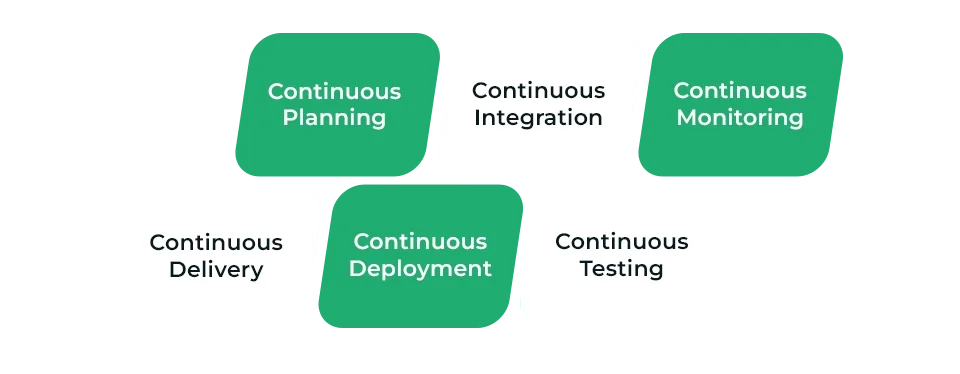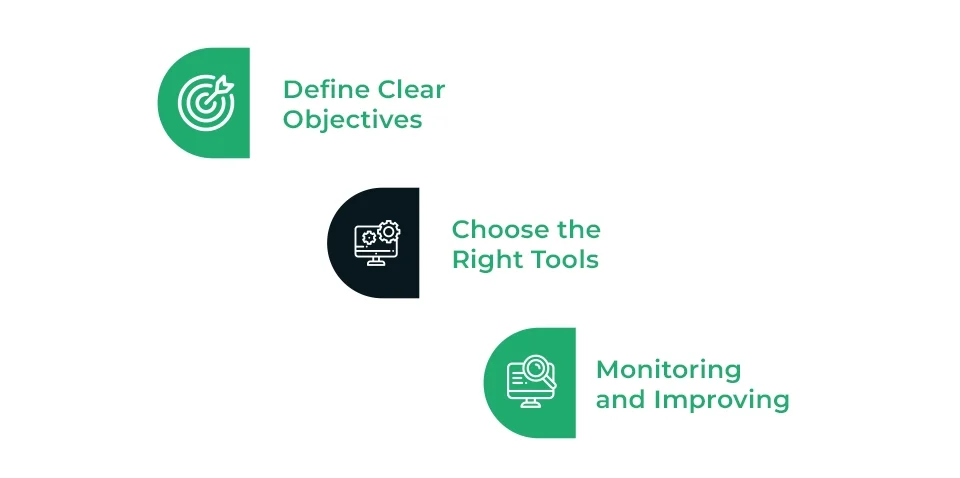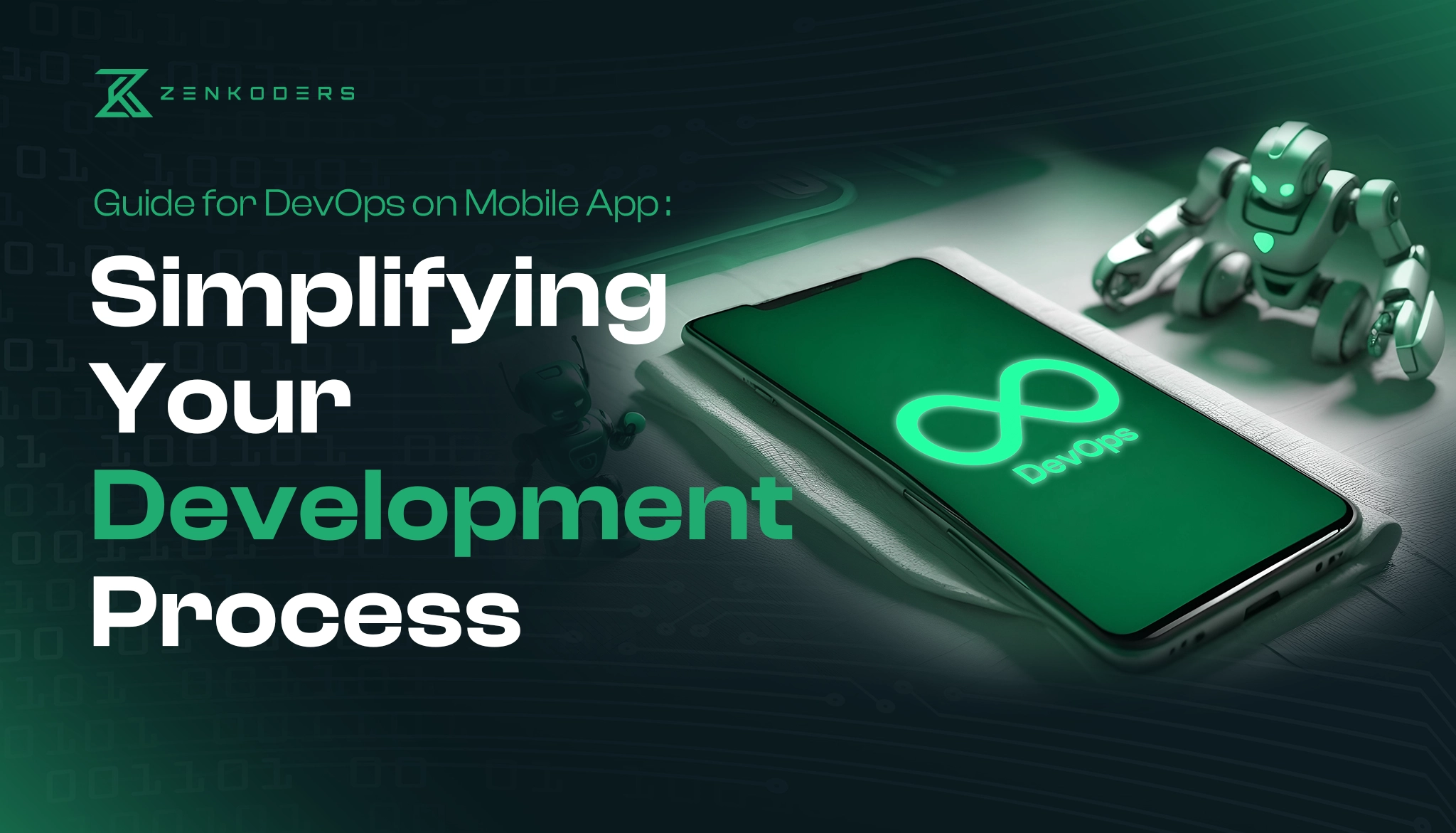Introduction
Around 84k+ mobile applications were released only in the first two months of 2024. The mobile app development service revenue is predicted to reach a whopping 673k million dollars by 2027. This makes one thing very clear the app development market shows no sign of slowing down in the near future. The question here is how at this fast pace these applications are being released in a fully functional condition?
It takes more than just writing code to make a great mobile app. You need to use an advanced approach that guarantees quality and speed. This is exactly where DevOps steps in. DevOps allows organizations to automate many processes of development including testing, deployment, and infrastructure. This reduces the amount of time spent on each process and allows for speedier development of fully working apps as they were intended to be.
Looking for the best mobile app developers?
What is DevOps?
DevOps blends software development and IT operations. It aims to speed up the SDLC (Software Development Lifecycle) while improving quality. DevOps promotes teamwork between development and operations teams, breaking down traditional barriers. This approach allows organizations to release updates and improve products faster than conventional methods.
Here the focuses on is on automation, integration, and continuous delivery. This teamwork spans from design to production support. For this purpose, many automation tools are available to automate much of the manual work in development and deployment.
Considerable Statistics for DevOps:
- Over the last decade, companies implementing DevOps have seen a 68% reduction in deployment failures.
- Companies that use DevOps are 24% more likely to outperform competitors.
- Companies with a strong DevOps culture experienced 51% fewer change failures.
- 58% of companies reported that implementing DevOps greatly improved software quality.
- By 2025, 80% of regular IT tasks will be automated, which is a key part of DevOps.
- After using DevOps, 70% of businesses said that failures were found and fixed more quickly.
- Job postings for DevOps roles increased by 52% between 2018 and 2023.
DevOps And its Main Component:
Continuous Integration
CI is the practice of merging code often. An automated system then tests these merges, catching issues early.
Continuous Delivery
CD builds on CI. Focusing on automatically deploying all code changes to a testing or production environment after the build stage. This makes software releases reliable.
Microservices
DevOps often uses microservices. Here, applications are broken down into smaller, independent services. Each one can be developed, launched, and scaled on its own.
Infrastructure as Code
IAC is a DevOps practice. It automates the setup of servers, networks, and storage. Instead of doing the setup manually, you write code to configure these resources automatically.
Monitoring and Logging
This approach helps companies to continually keep track of their applications. It allows you to detect and respond to issues in your application timely.
Communication and Collaboration
DevOps puts a strong emphasis on communication and teamwork for a smooth software delivery process.
Difference Between DevOps and Agile Methodology in App Development

DevOps and Agile are the two most popular approaches in mobile app development. All businesses use at least one of these techniques to improve their development process.
Both are sometimes confused with one another. But that’s not the case. Let’s talk about what differentiates DevOps from Agile development.
DevOps in Mobile App Development
DevOps focuses on automated processes for building, testing, and deploying apps smoothly. By merging development and operations, DevOps assures collaboration and responsibility. This makes the development process faster, more reliable, and better. It is a set of practices that use automation tools to speed up the process from coding to deployment. This allows both teams to quickly deliver updates and new features.
Agile in App Development
In contrast, Agile is a flexible method that focuses on iterative development and constant feedback. It divides development into short phases called sprints, which are later combined for final testing. At the completion of each sprint, stakeholders and customers review, which leads to improvements. Agile encourages collaboration among developers, designers, and testers. It is implemented using frameworks like Scrum and Kanban that help teams manage workflows and stay responsive to changes.
Comparison Between DevOps and Agile
Feature | DevOps | Agile |
Core Focus | Focuses on both development and operations | Focuses on iterative development |
Scope | Involve the entire software lifecycle, using CI, CD, CT, and more | Includes managing the development process only, using Scrum, Kanban, etc. |
Release Frequency | Continuous delivery with multiple releases per day. | Incremental releases are based on sprints, Usually every few weeks. |
Feedback | Feedback is provided through automated monitoring tools. | The source of feedback is end users. |
Cultural Impact | Fosters a culture of shared responsibility across development and operations. | Promotes a culture of flexibility and adaptability within the development team. |
Tools Used | Jenkins, Docker, Kubernetes. | Jira, Scrum, and Kanban boards. |
Security | Integrates security practices throughout the development. | Security is addressed later in the development process. |
Speed of Deployment | Automated deployments with less manual intervention. | Deployment speed depends on sprint cycles and project complexity. |
What Are the 6 C’s of Mobile DevOps?

Given the challenges of mobile app development, Mobile DevOps introduces a set of principles known as the 6 C’s to guide the development process.
Continuous Planning
Continuous planning is the first step in the Mobile devOps process. This helps the teams in operations and development have a common vision and goal. Involving all the stakeholders in the process planning helps to define the scope, create clear objectives, and spot challenges early. This technique helps to get everyone on the same page and reduces the likelihood of delays.
Continuous Integration
Continuous integration is the process of adding code changes to a common repository frequently. Every developer working on the mobile app routinely combines their code so that any conflict may be found and fixed immediately. By automating the build process and running tests, teams make sure that the app is always in a releasable state.
Continuous Monitoring
It is an automated process that helps DevOps teams find compliance issues early in the DevOps process. It observes and analyses the performance, and security of the system throughout the SDLC. Monitoring tools provide insights into user behavior/ app crash performance metrics, helping to maintain the stability and performance of the app.
Continuous Delivery
Continuous delivery makes an app ready for release at any time. It automatically builds, tests, and packages code changes. Making sure that deployments can be done whenever needed. In mobile app development, this means updates are quick and are done regularly. Keeping the app competitive.
Continuous Deployment
It is a process in which every code that passes the automated testing step is pushed into the production environment. This helps guarantee that the delivery process is continuous.
Continuous Testing
The main goal of Continuous Testing is to check the app in advance. This process helps address all the bugs and issues before they reach production, to make sure that quality products are delivered to clients. Here, automated tools are used to conduct a wide range of tests.
DevOps and its Tools for Mobile App Development

Docker
Docker is a platform-as-a-service (PaaS) software product. It uses OS-level virtualization to deliver software in packages called containers. These containers include everything that a software needs to run, including libraries, system tools, code, and more. These containers are portable. They run the same in any environment. This makes the app work the same in development, testing, and production. It automates the deployment of applications and reduces the risk of environment-related issues.
Kubernetes
Kubernetes is an open-source container orchestration platform. It automates the deployment, scaling, and management of containerized applications. In mobile app development, Kubernetes can be used to manage the infrastructure that supports the app. You may confuse Docker and Kubernetes as the same. They are, yet, complementary tools for containerized apps. While docker containerizes your mobile application Kubernetes lets you manage them efficiently. Like a skilled courier, Kubernetes transports and deposits containerized applications securely to their designated deployment destinations.
Appium
Appium is an open-source tool for automating mobile app testing. It helps spot errors in an application and makes sure that an app is working as intended. It supports cross-platform testing including Android, iOS, web, and desktop apps. Appium mobile testing framework may be utilized with a variety of programming languages, including Java, Ruby, Python, and others, making it simple for developers and testers to apply their existing coding expertise and get familiar with it. It integrates with CI/CD tools using popular testing frameworks. These include TestNG, JUnit, Pytest, and Cucumber. This enables continuous testing of mobile apps throughout the development lifecycle.
Git/Gitlab
Git is a distributed version control system that tracks changes in source code. This allows multiple developers to work on a project at the same time without any conflicts. While GitLab extends Git’s capabilities by offering an integrated platform that includes CI/CD pipelines, project management, and issue tracking. This integration makes development more well-organized and reduces the time from code creation to deployment.
AWS DevOps
AWS DevOps is a set of tools provided by Amazon Web Services that support the automation of the software development lifecycle in cloud environments. AWS DevOps is popular in mobile app development. It ensures a quick, reliable app that can be scaled to handle growing user bases. With a variety of security solutions including AWS Identity and Access Management and AWS Security Hub. While automating many other processes AWS Cloud also helps teams to maintain the security of their apps and data.
What is the Impact of DevOps on Mobile App Development?
Connecting Development and Operations
Unlike traditional SDLC, where both the operations and development teams work separately and come across challenges such as miscommunication, delays, and inefficiencies. The DevOps bridges all these gaps. It assists in creating an environment where both teams can work together from the start. This collaboration results in a smoother development process with fewer difficulties and a more reliable error-free app.
Ongoing Integration and Delivery
With many complex applications that are now being developed CI/CD part in DevOps for mobile app development is more important than ever before. It makes sure that all the changes that are done in the code throughout the development are continually merged into the main branch, allowing teams to detect and resolve conflicts early. This makes the app ready to be deployed anytime, even with frequent updates. This continuous approach helps developers react fast to customer feedback and market needs.
Regular Updates
In the mobile app world, regular updates are key to staying competitive. Updating mobile apps traditionally is hard and risky. It requires thorough testing before each release. This process limits how often apps can be updated. DevOps simplifies frequent updates without disrupting user experience. It automates building, testing, and deploying updates. This keeps the app relevant and maintains user trust and satisfaction.
Benefits of Adopting DevOps
Increased Security
Security is an important concern in mobile app development, and DevOps helps address this challenge by integrating security practices into the development process. By applying security measures early and consistently in the development lifecycle, DevOps makes sure that the app is secure from the beginning. Using this DevSecOps method lowers security risk so that your app meets industry standards.
User-Centric Development
DevOps places a heavy emphasis on continuous feedback, to guarantee that the user’s preferences are always at the forefront of development efforts. By collecting and analyzing user feedback in real-time, developers can make data-driven decisions and prioritize features that will have the most impact on the user experience.
Cost Reduction
It reduces the overall development costs. Using automation in many areas it lowers the need for manual intervention, while continuous integration and delivery guarantees problems are identified and fixed early reducing the cost of fixing bugs later.
Handling Bottlenecks
Many bottlenecks and corner cases are eliminated through DevOps in the development process. Traditional software development often involves handoffs between development, testing, and operations teams, resulting in delays and communication breakdowns. DevOps breaks down these isolations by promoting collaboration and integration between teams. Automated testing and deployment pipelines further simplify the process, preventing them from becoming major problems down the road.
Creation of Advanced Mobile Apps
The combination of rapid development cycles, continuous feedback, and handling the resources smartly assists in advanced mobile application development. DevOps approaches allow teams to test new products and technologies risk-free, without delays or costly setbacks.
Smart Use of Resources
DevOps promotes the efficient use of human and technical resources. It reduces the amount of manual work required, allowing team members to focus on more complex activities. DevOps practices such as Infrastructure as Code allow more improved management of computing resources, facilitating the servers and applications to run smoothly. This efficiency not only reduces operating costs but also increases the productivity of the development team.
Necessary Steps to Consider While Implementing DevOps

When you are implementing DevOps within your business there are some necessary steps that you need to consider that are:
Define Clear Objectives
The first thing that you need to consider while implementing DevOps in your business is the outcomes that you hope to achieve. What is your goal? Is it to improve your app quality or increase the collaboration among the teams? Identifying the area that needs automation will help you meet your specific needs. They also let you measure your success.
Choose the Right Tools
Once you are done defining your goals. The second most important part is choosing the right tools to implement DevOps. You have to be smart enough to select the appropriate tools that meet your project demand. For example, if you want to automate your CI/CD pipeline, consider using Bamboo or GitLab.
Monitoring and Improving
DevOps is a continuous process, not a one-time task. It needs constant monitoring and improvement to be impactful for your business. Gather user feedback to spot areas that need changes. Regularly review and adjust your DevOps practices to meet your goals.
DevOps Adoption Challenges in Mobile App Development
Cultural Shift:
Whether it is our day-to-day life or professional work environment adopting change is difficult it comes with a cost but is always rewarding. Similarly, DevOps also requires a notable cultural shift in organizations when implemented. This shift is challenging as it demands changing mindsets, workflow, and how the teams operate normally.
Implementing DevOps to Legacy System
Every organization works with its legacy systems that were not built with DevOps practices in mind. The modern DevOps tools and workflows might be complex and time-consuming to integrate with these systems. Not only this but sometimes you need to completely revamp your existing processes to implement DevOps.
Skill Gaps:
As we know DevOps is a completely different industry that automates your usual manual task to increase productivity and save time. Your current employees may lack new skills such as cloud storage management and the ability to use different automation tools. Therefore, training them can be challenging and may require a lot of resources initially.
Security Concerns:
DevOps is all about completing development and deployment at a quick pace. This rapid completion of tasks brings security concerns. The Developers want to get software into the system pipeline as quickly as possible, but security teams want to get rid of all the security threats. While this conflict causes delays, it is important in the long run. Hence, DevSecOps requires careful planning and close collaboration between teams.
Complexity for Mobile App Environment:
When it comes to mobile devices there are wide range of factors that need to be considered such as operating systems, screen sizes, and more. This makes the DevOps process complex to implement. Making sure that automated testing and deployment work smoothly across different environments with frequent updates can be challenging.
What is the ROI of Mobile DevOps?
Customer Satisfaction
Every business aims to deliver the best services that satisfy their customers and improve their experience. With DevOps practices, you can develop high-performance mobile apps for your customers that work smoothly and as per their preferences. Rapid bug fixes and continuous improvements contribute to customer satisfaction, resulting in higher retention rates and positive reviews.
Improved Mobile App Quality
Mobile DevOps stresses on continuous integration and delivery and it also automates testing, all of which leads to better quality of the app. DevOps is designed to catch and mitigate problems as early as possible in the application development process so that only high-quality features are implemented in production. There are fewer crashes and a more reliable app in return for this. Higher app quality offers a better user experience, which is important for an organization to keep itself competitive in the market.
Reduces Risk
DevOps techniques aim to reduce the risks connected to deployment and software development. Constant integration and testing provide early identification of any faults, therefore lowering the possibility of major development-related concerns. Furthermore, quick rollback of changes in case of a problem reduces the possible impact of any problems that do appear later. This proactive risk management not only maintains the app’s reputation but also lowers the risk of spending extra costs that you need to spend in case of app failure.
Better Decision Making
Through real-time data and insights into app performance and user behavior, mobile DevOps helps to improve decision-making. Constant monitoring tools gather important information that can be applied to guide future updates, prioritizing features, and resource allocation decisions. Using this data-driven strategy, development is guaranteed to be in line with user preferences and organization goals, leading to more successful app outcomes and a better overall ROI.
Our expert team can create functional and beautiful designs
Conclusion
In the end, DevOps is not just a set of practices or tools it’s a mindset. It’s about breaking down barriers for improvement. Though it may be tough at first to integrate DevOps practices into your business in the longer run it guarantees benefits. Adopting DevOps can help you build a more reliable and scalable mobile app development process that guarantees your app satisfies the expectations of the current demanding users. So, if you haven’t already, now is the time to adopt DevOps and improve your mobile app development.
Zenkoders mobile app development is recognized as top-rated in the USA. We provide complete fast-paced solutions to our customers by implementing DevOps practices at our company. Whether it is brainstorming to improve your idea or developing your app with the latest technologies to provide your customers with a smooth experience. We make sure to deliver the best services.


